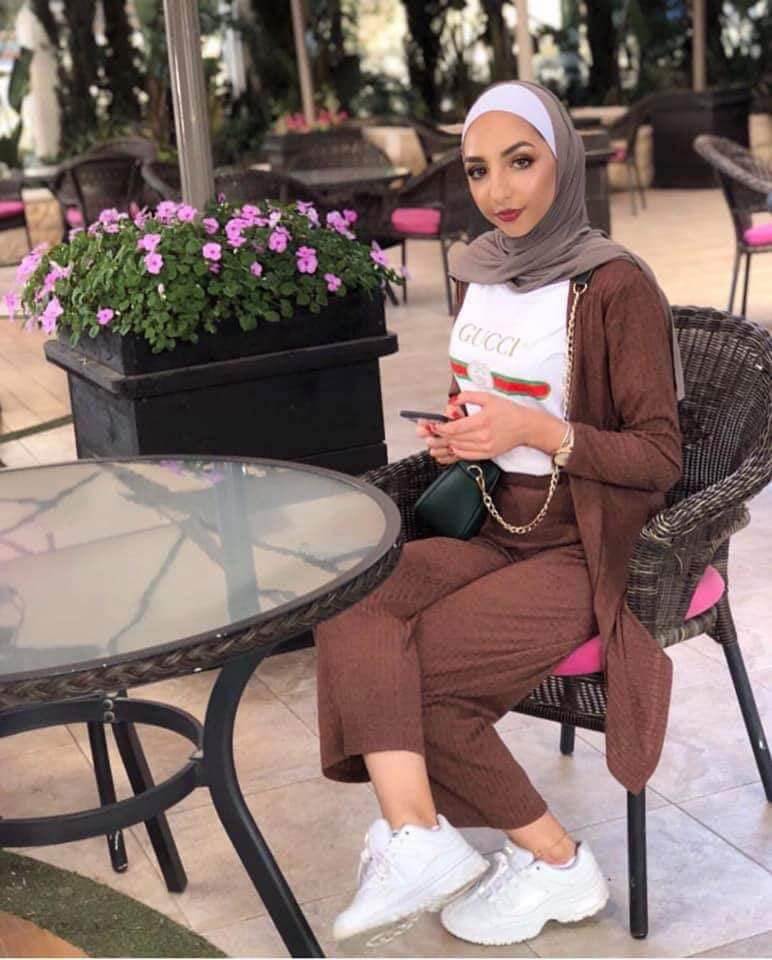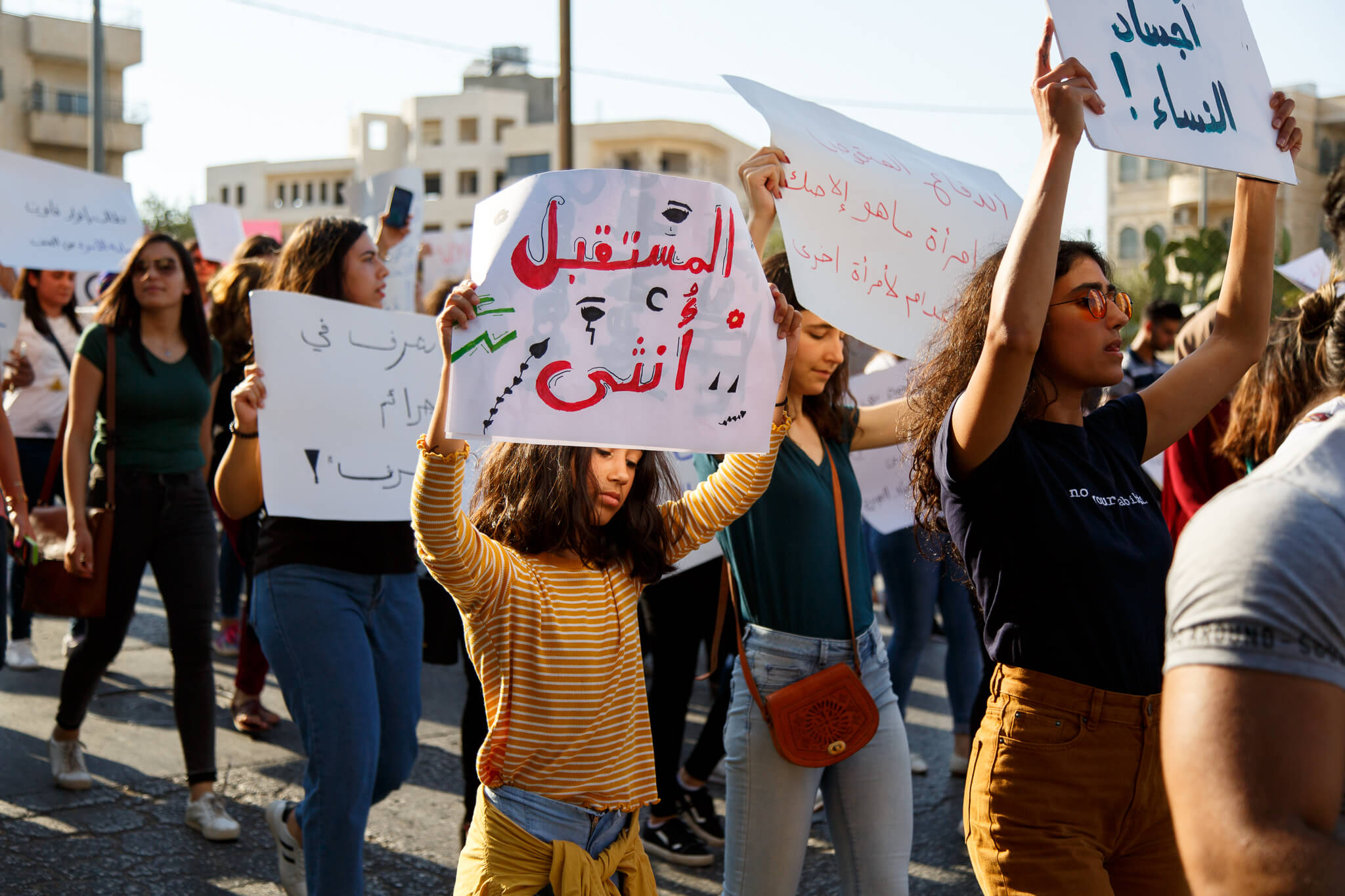The suspected “honor killing” of a 21-year-old Palestinian woman from a village outside of Bethlehem has sparked outrage across the West Bank, shining a light on gender-based violence in Palestine.
Hundreds of protesters marched through Bethlehem to Beit Sahour on Saturday, and on Monday another protest was held outside of the Prime Minister’s office in Ramallah, calling for justice for the young make-up artist, Israa Ghrayeb. Demonstrators called for accountability, chanting “We are all Israa,” and “stop killing women.”
Prime Minister Mohammad Shtayyeh announced during a cabinet meeting on Monday, “A number of people have been arrested for interrogation,” but did not disclose further details.

Ghrayeb died on Thursday, August 22 at her home after she was discharged from the hospital where she was admitted for spinal injuries. Although the circumstances around her death are unclear, many speculate she was killed by male family members after she posted a video of herself on social media with a man she was soon to be engaged to.
According to different media reports, Israa was allegedly severely beaten and tortured in her family home. While attempting to escape her family’s violence, Israa fell or jumped from the second story of the family house, causing severe spinal injuries leading to hospitalization.
She was then reportedly assaulted by her family a second time while in the hospital. Audio of the alleged attack was recorded by a nurse and went viral. In the footage, a woman can be heard screaming along with a thumping or striking noise.
Doctors at the Bethlehem Arab Society for Rehabilitation confirmed Israa was admitted for spinal treatment, however, medical staff refrained from commenting on the severity of her spinal injuries or the alleged assault.
Israa’s family has denied the accusations, claiming Israa died from a heart attack, and that the sounds of her screaming in the hospital were due to a psychotic episode.

According to Palestinian NGO the Women’s Center for Legal Aid and Counselling (WCLAC), 23 Palestinian women and girls were killed in 2016, 28 in 2017 and 23 cases in 2018.
The General Director of WCLAC Randa Siniora explained the difficulty in categorizing “femicides,” or death as gender-based violence, as many of the killings are still under investigation or were classified as a suicide.
“This year there are 18 cases of unknown reasons for death, suicidal cases and femicide, with 14 in the West Bank and eight in Gaza. Six are confirmed femicide in the West Bank, the others are under investigation,” Siniora told Mondoweiss.
International organizations and thousands across social media have also called for the Palestinian Authority to increase awareness around gender-based violence and the laws relating to femicide. In a Facebook post, Shtayyeh stated, “We must strengthen the system of legislation protecting Palestinian women.”
Several Palestinian laws grant leniency to men convicted of killing female relatives, sometimes referred to as an honor killing. Many are inherited Jordanian regulations that pre-date the 1967 war when Israel took over the West Bank and East Jerusalem and the establishment of the Palestinian Authority in the 1990s.
In the past perpetrators of honor killings received reduced sentences under Article 98 and 99 of the Palestinian Penal code, which “grants judges the ability to dramatically reduce sentences,” if “extenuating circumstances” could be proven. In 2014 a UN human rights report written by Palestinian judge Ahmad al-Ashqar, said that “legislation in place contributes, to a large extent, to building a social awareness that killing under the pretext of honour is acceptable.”
A series of legal reforms beginning in 2011 upended sentencing protections for men convicted of killing women. Most recently in March 2018 a presidential decree officially nullified Article 98 and 99. Despite this, WCLAC Director Randa Siniora, explained that change only benefits women who were victims of femicide after the implementation of the amendment.
“Any crimes committed before that, would be according to the provision before the amendment,” Siniora said, and therefore could use Article 98 and 99 to achieve a lesser sentence. “In general, we rarely see the impact of the law on cases from these amendments.”
“We are fed up with the slight amendments here and there. These amendments are not reflective of the actual need for the protection and access to justice for women who are victims of gender-based violence and femicides,” Siniora added.
Siniora also has called on a comprehensive investigation be made in the case of Israa Ghrayeb, not only against the immediate perpetrator but anyone “found cooperating should be persecuted.”
“I mean in the hospital, we have to know exactly what happened, exactly at the medical level. There was a lot of suspicion of why her spinal cord was broken and how she was injured,” Siniora said.
During the Bethlehem protest, activist and founder of feminist clothing store Baby Fist, Palestinian-American Yasmeen Mjalli, 23, from North Carolina spoke with Mondoweiss about how Israa’s death represents a worldwide phenomenon of gender-based violence, not just an “Arab problem.”
“This is happening all over the world,” she said. Mjalli mentioned Italy–where until 1981 men received a reduced sentence of three to seven years for murdering a spouse or daughter under a law that invoked the word “honor”–“but we always seem to make it an Arab issue.”
Mjalli criticized an impulse in Palestinian society to stave off progress on legal protections for women and girls.
“Often what we hear is that we can’t work on women’s rights issues until the occupation is over, otherwise you’re criticized of distracting from the occupation,” Mjalli stated. “But you can’t have national liberation without social liberation. They have to work together or we’re never going to achieve either.”
Protesters in front of the P.M.’s office in Ramallah demanding justice for #IsraaGhrayeb & protection for women from violence & discrimination. “Honor” crimes are dishonourable premeditated murder. #كلنا_اسراء_غريب pic.twitter.com/Q2IvvF9SJ4
— Hanan Ashrawi (@DrHananAshrawi) September 2, 2019
Head of the PLO General Assembly for Palestinian Women, Ahlam Wahsh, spoke to Mondoweiss about the repercussions Israa’s death has had on the dialogue surrounding women’s rights in Palestine.
“Even though this has been a huge tragedy and shock for everyone, this has encouraged so many people to raise their voices because hundreds of incidents such as this one have happened and nobody dares to speak this aloud,” Wahsh said.
“We have spoken with the national prosecutor and we have spoken with the head of the municipality. We have also sent many messages to the president himself, and to the Prime Minister specifically about this incident,” Wahsh said.
“Today for Israa,” Wahsh declared, “We want to announce to everyone that it’s time to finish this. It’s time for the bloodshed to stop.”




Palestinians should leave whataboutism to Zionists and – unlike Zionists who strive to be less bad than the worst – strive to be as good as the best.
This is horrendous. There’s no conceivable reason protections for women have to sit on a back burner until the end of the occupation.
Yeah, lets dissolve the Jewish State in favor of a Palestine ‘from the river to the sea’; an ultra conservative Arabic society where you throw your daughter out the window because she posted a pre-wedding selfie of herself and her betrothed.
Oh, BTW, will Phil and Adam and Annie move from America to live in the new ‘Palestine paradise’ they’ve sacrificed their lives to create?
#%$k no!
Not in a million years!
The rankest hypocrisy.
@Jackdaw
“No, it is a mature rejection of the Arabic culture; which repressive and retrograde culture most Israeli Jews are aware of from when their Sephardic and Mizrahi grandfathers and grandmothers were thrown out of the Arab States in response to the creation of the State of Israel.”
Reality
To be brief:
The situation for Jews in Arab countries did deteriorate as a consequence of “Israel’s” dispossession and expulsion of well over one million Palestinians (1948-67) and its ongoing territorial expansion, their immigration to Israel was prompted for the most part by Israeli recruiters sent to Iraq, Yemen, throughout North Africa and elsewhere along with terror attacks by Israeli agents, e.g., bombing of Jewish synagogues and businesses by “The Movement” in Iraq, the Lavon affair in Egypt, Israeli agents bombing US and British concerns in Cairo, the Cohen spy affair in Syria as well as worsening economic conditions and a desire by some to fulfill their perceived duty of aliyah.
To quote Yehouda Shenhav, of Iraqi Jewish heritage and professor of sociology and anthropology at Tel Aviv University: “Any reasonable person, Zionist or non-Zionist, must acknowledge that the analogy drawn between Palestinians and Mizrahi [Arab] Jews is unfounded. Palestinian refugees did not want to leave Palestine….Those who left did not do so of their own volition. In contrast, Jews from Arab lands came to this country under the initiative of the State of Israel and Jewish organizations.” (Ha’aretz, 8 October 2004.)
Renowned Israeli historian Avi Shlaim, born in Baghdad, concurs: “We are not refugees, nobody expelled us from Iraq, nobody told us that we were unwanted. But we are the victims of the Israeli-Arab conflict.” (Ha’aretz, 11 August 2005)
Ran Cohen, member of the Knesset: “I am not a refugee….I came at the behest of Zionism, due to the pull that this land exerts the idea of redemption. Nobody is going to define me as a refugee.” (Ha’aretz, 8/10/04)
Shlomo Hillel, former minister and speaker of the Knesset: “I don’t regard the departure of Jews from Arab lands as that of refugees. They came here because they wanted to, as Zionists.”
It must be noted that whereas the expulsion of well over one million Palestinians between late 1947 and 1967, was carried out by Jewish forces and the IDF, Palestinians played no role whatsoever in the departure of Jews from Arab countries. In short, apples and oranges.
The treatment that many women receive is terrible, Arabs and Muslims currently seem to be leading the world in circumscribing and destroying womens lives, it is matter of profound shame for many of us, and many women are as you would expect very resistant, while a religious gloss is always smeared on these terrible crimes, we for some reason in the east do that with pretty much everything questionable but these attitudes and practises relate more to traditional culture some elements of which place women in an impossibly onerously burdened position and economic other social factors, two young women from my immediate family told their fathers and family to go to hell and disappeared one contacting us 10 years later to say she ok married had children and was happy we never heard again, and the other apparently went to Europe by some ruse she was very well qualified and is in touch with other women in the clan on condition of their discretion, the first was my Uncles daughter my actual cousin, not seen her since I was 17, we are a terrible peasantry.
al youm al sabea has an article about ‘the marriage of the sunnis’, google translated it but you can gleen enough
“For the first time in Upper Egypt, the family court in Qena provides for the genealogy of a child born of underage marriage. Her mother: the judiciary is fair to me .. I was married at the age of 16 years to someone older than me 10 years .. My husband mutilated my reputation and refused to perform DNA analysis twice.
Wednesday, 04 September 2019 03:30 PM……
The details of the case last year, where “Farah Nasr Boraie” filed a complaint with the Public Prosecutor, for falling into the trap of underage marriage trick after she married at the age of 16 years underage marriage without a contract, and soon disputes between her and her husband, he divorced and refused to attribute the child to him exploiting the lack of The presence of any supporting documents.”
https://www.youm7.com/story/2019/9/4/لأول-مرة-فى-الصعيد-محكمة-الأسرة-بقنا-تقضى-بصحة-نسب/4402667